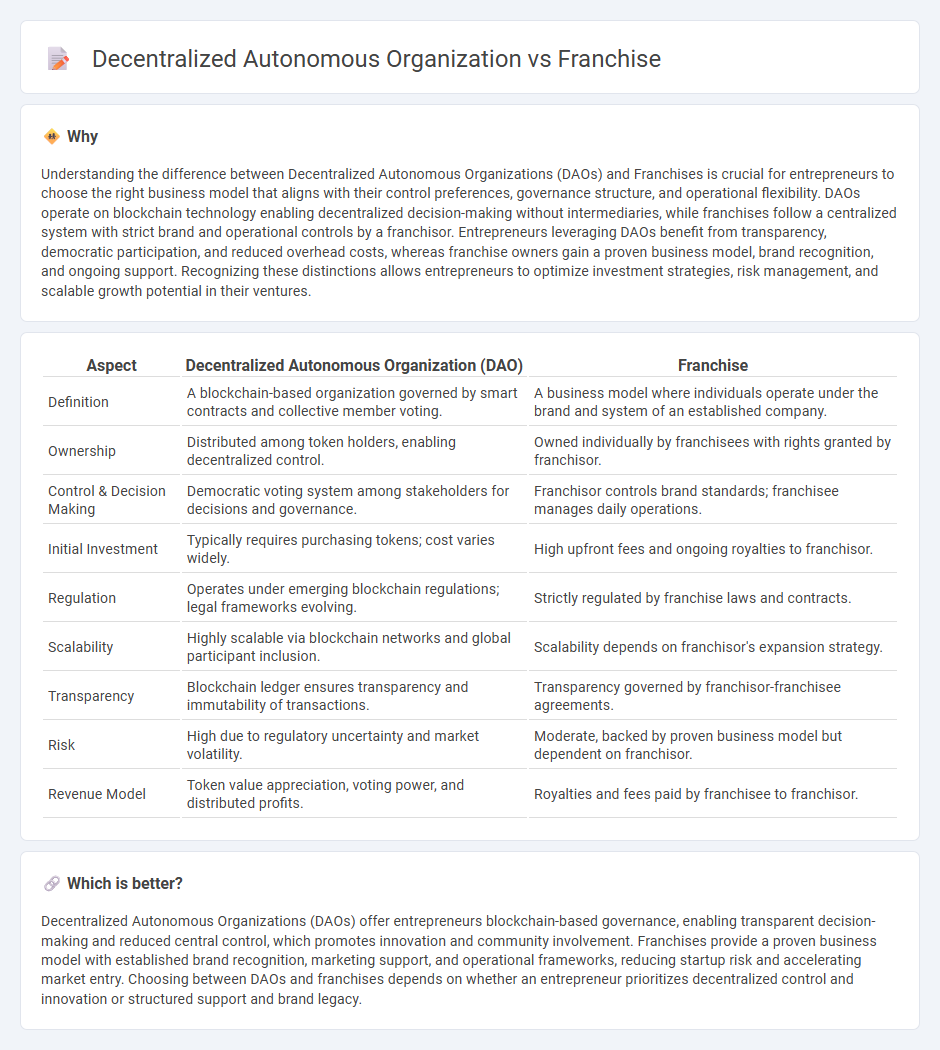
Decentralized autonomous organizations (DAOs) operate on blockchain technology, enabling transparent decision-making and eliminating traditional management hierarchies. Franchises, in contrast, rely on established business models and centralized control with franchisees paying fees for brand use and operational support. Explore the distinct advantages and challenges of DAOs and franchises to find the best path for your entrepreneurial goals.
Why it is important
Understanding the difference between Decentralized Autonomous Organizations (DAOs) and Franchises is crucial for entrepreneurs to choose the right business model that aligns with their control preferences, governance structure, and operational flexibility. DAOs operate on blockchain technology enabling decentralized decision-making without intermediaries, while franchises follow a centralized system with strict brand and operational controls by a franchisor. Entrepreneurs leveraging DAOs benefit from transparency, democratic participation, and reduced overhead costs, whereas franchise owners gain a proven business model, brand recognition, and ongoing support. Recognizing these distinctions allows entrepreneurs to optimize investment strategies, risk management, and scalable growth potential in their ventures.
Comparison Table
| Aspect | Decentralized Autonomous Organization (DAO) | Franchise |
|---|---|---|
| Definition | A blockchain-based organization governed by smart contracts and collective member voting. | A business model where individuals operate under the brand and system of an established company. |
| Ownership | Distributed among token holders, enabling decentralized control. | Owned individually by franchisees with rights granted by franchisor. |
| Control & Decision Making | Democratic voting system among stakeholders for decisions and governance. | Franchisor controls brand standards; franchisee manages daily operations. |
| Initial Investment | Typically requires purchasing tokens; cost varies widely. | High upfront fees and ongoing royalties to franchisor. |
| Regulation | Operates under emerging blockchain regulations; legal frameworks evolving. | Strictly regulated by franchise laws and contracts. |
| Scalability | Highly scalable via blockchain networks and global participant inclusion. | Scalability depends on franchisor's expansion strategy. |
| Transparency | Blockchain ledger ensures transparency and immutability of transactions. | Transparency governed by franchisor-franchisee agreements. |
| Risk | High due to regulatory uncertainty and market volatility. | Moderate, backed by proven business model but dependent on franchisor. |
| Revenue Model | Token value appreciation, voting power, and distributed profits. | Royalties and fees paid by franchisee to franchisor. |
Which is better?
Decentralized Autonomous Organizations (DAOs) offer entrepreneurs blockchain-based governance, enabling transparent decision-making and reduced central control, which promotes innovation and community involvement. Franchises provide a proven business model with established brand recognition, marketing support, and operational frameworks, reducing startup risk and accelerating market entry. Choosing between DAOs and franchises depends on whether an entrepreneur prioritizes decentralized control and innovation or structured support and brand legacy.
Connection
Decentralized Autonomous Organizations (DAOs) and franchises both represent innovative business models that decentralize control and streamline operations. DAOs leverage blockchain technology to enable stakeholder-driven decision-making without centralized authority, while franchises employ a structured system for replicating a successful business model across multiple locations through licensing agreements. Both models facilitate scaling entrepreneurship by distributing operational responsibilities and fostering community or partner engagement.
Key Terms
Ownership Structure
Franchises operate under a centralized ownership structure where the franchisor grants rights to franchisees to run individual locations, maintaining control over brand standards and operations. Decentralized Autonomous Organizations (DAOs) utilize blockchain technology to distribute ownership and decision-making power among all token holders, promoting a democratic and transparent governance model. Explore how these contrasting structures impact control, risk, and scalability in different business environments.
Governance Model
A franchise operates through a centralized governance model where the franchisor retains control over brand standards, operational procedures, and overall business strategy, ensuring uniformity across locations. In contrast, a decentralized autonomous organization (DAO) employs blockchain technology to enable decentralized governance, allowing stakeholders to propose and vote on decisions, fostering a transparent and democratic operational structure. Explore the nuances of governance models in franchises and DAOs to understand their impact on business scalability and control.
Revenue Sharing
Franchises operate with a centralized control structure where revenue sharing is typically defined by fixed royalty fees and percentages outlined in franchise agreements. Decentralized Autonomous Organizations (DAOs) use blockchain technology to automate revenue distribution among members through smart contracts, ensuring transparency and real-time profit sharing. Explore how revenue sharing models differ significantly between these organizational types and what that means for stakeholders.
Source and External Links
Franchising - Franchising is a business expansion strategy where a franchisor licenses its brand, know-how, and business model to a franchisee who pays fees and operates under the franchisor's system, allowing growth with minimized capital investment and liability risk for the franchisor.
What is a Franchise - International Franchise Association - A franchise is a licensing relationship where the franchisor grants the franchisee the right to use its trademark and business system, providing training, support, and brand standards, with business format franchising and product distribution franchising as two main types.
A Consumer's Guide to Buying a Franchise - FTC - A franchise enables operating a business under a franchisor's established brand and system, requiring payment of an initial franchise fee, ongoing royalties, and possibly advertising fees, with franchisor support including training and operational assistance.
 dowidth.com
dowidth.com